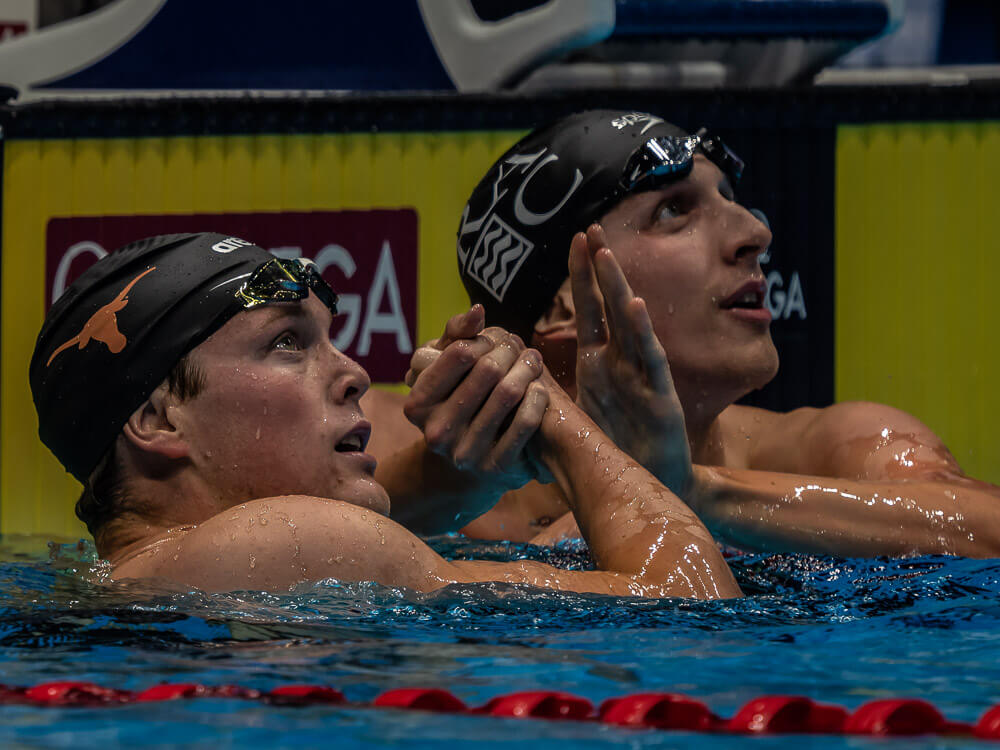Olympic Relay Analysis: Great Britain Favored in Men’s 800 Free, Americans in Pursuit (Composite Times Included)

- by Admin
- June 26, 2024

Olympic Relay Analysis: Great Britain Favored in Men’s 800 Free, Americans in Pursuit
The United States had never missed an Olympic relay podium until 2021, when the men’s 800 freestyle relay group faded out of contention and ended up fourth. But since then, a young group of 200 freestylers have built up international experience, winning gold at the 2022 World Championships and silver a year later. The Americans are not at risk missing the podium this time around.
But gold? That looks like a challenge as Great Britain returns the exact same foursome that captured gold and finished just off the world record at the Tokyo Olympics. At that meet,, Tom Dean and Duncan Scott had already finished 1-2 in the individual 200 freestyle while James Guy had been a world champion in the past. Matt Richards was the wild card rookie who performed admirably in a big spot.
Now, Richards is the reigning world champion in the 200 free while Dean did not even qualify for the individual event in Paris thanks to Scott’s resurgence after a period where he dealt with injuries and missed the 2022 Worlds entirely. The Brits were again just off the world record when they reclaimed the world title last year in Fukuoka while the United States finished one-and-a-half seconds behind, missing the seven-minute barrier by two hundredths.
The U.S. has assembled a team for Paris consisting of Luke Hobson, Chris Guiliano, Drew Kibler and Kieran Smith. Kibler and Smith have been part of this squad since Tokyo while Hobson has emerged as the country’s clear frontrunner in the event, breaking 1:45 for the first time in 2023 and doing so again in the Trials final. He is also the fastest man ever in the 200-yard freestyle
Guiliano, meanwhile, broke out last year when he qualified for World Championships in the 100 free, but he was not seen as a serious contender for the 200-meter race at these Trials. He entered with a best time of 1:48.75. Three rounds later, Guiliano has clocked 1:45.38 to secure an individual swim as well as a significant relay role in Paris.
Other countries capable of jumping into the mix include Australia, featuring a handful of 1:45s and talented young swimmers in Max Giuliani and Kai Taylor. Meanwhile, both China and South Korea have assembled some depth around their respective standouts, 100 freestyle world-record holder Pan Zhanle for China and Doha world champion Hwang Sun-woo for the Koreans.
With many top Americans, Aussies and Brits absent, China edged Korea for gold at February’s Worlds, with both Wang Haoyu and Zhang Zhanshuo splitting 1:45s alongside Pan’s 1:43.90 while Korea got a 1:43.76 from Hwang while Kim Woo-min went 1:44.93 and Lee Ho-joon 1:45.47. But given the results from Great Britain and the United States, the best-case scenario for any of these teams would likely be bronze.
Here are the composite relays formed from the top-four times in each country in 2024:
Great Britain: 1:44.69 + 1:44.75 + 1:45.09 + 1:45.28 = 6:59.81
United States: 1:44.89 + 1:45.38 + 1:45.39 + 1:45.60 = 7:01.26
Australia: 1:45.83 + 1:45.89 + 1:45.90 + 1:46.02 = 7:03.64
South Korea: 1:44.75 + 1:45.68 + 1:46.43 + 1:46.83 = 7:03.69
China: 1:45.68 + 1:45.86 + 1:46.28 + 1:46.88 = 7:04.70
That breakdown shows Great Britain as a significant favorite, but there is an X-factor, a key piece missing from the equations above: Carson Foster. The IM specialist, who will head to the Olympics with the world’s fastest time in the 400 IM this year. Foster has been part of the U.S. men’s squad every time since 2022, and he gave the best 200-meter effort of his career at this February’s Worlds, a meet that otherwise included a mixed bag of performances for the 22-year-old.
Foster split 1:43.94 on that relay, nearly equal to Hwang and Pan and enough to vault the U.S. into gold-medal contention until the very end. Smith, meanwhile, has consistently produced relay performances significantly above his level in individual events.
Again, the data suggests one outcome for gold in this event, but the Americans are within range and could, with a few outstanding performances, reclaim gold three years after the disastrous result in Tokyo.
More Olympic Relay Analysis:
The Latest News
-
December 22, 2024Life in one of Britain’s most miserable towns: Locals in Barking blast council ‘shambles’ and say shopping centre is so empty it is like living in a ‘ghost town’
-
December 22, 2024Christmas travel chaos continues with 100 Heathrow flights cancelled amid severe 80mph wind weather warnings
-
December 22, 2024Winds blow UK Christmas travel off course, with ferries and flights cancelled
-
December 22, 2024What next for Tyson Fury and Oleksandr Usyk? | Will Fury face Anthony Joshua and could Usyk retire?
-
December 22, 2024Let China build electric cars in UK, Tory ex-chancellor tells Rachel Reeves ahead of trade trip





